Related Research Articles
A closed platform, walled garden, or closed ecosystem is a software system wherein the carrier or service provider has control over applications, content, and/or media, and restricts convenient access to non-approved applicants or content. This is in contrast to an open platform, wherein consumers generally have unrestricted access to applications and content.
Mobipocket SA was a French company incorporated in March 2000 that created the .mobi e-book file format and produced the Mobipocket Reader software for mobile phones, personal digital assistants (PDA) and desktop operating systems.

Android is a mobile operating system based on a modified version of the Linux kernel and other open-source software, designed primarily for touchscreen mobile devices such as smartphones and tablets. Android is developed by a consortium of developers known as the Open Handset Alliance, though its most widely used version is primarily developed by Google. It was unveiled in November 2007, with the first commercial Android device, the HTC Dream, being launched in September 2008.
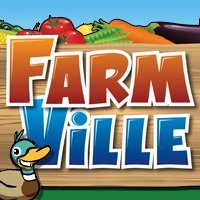
FarmVille is a series of agriculture-simulation social network games developed and published by Zynga in 2009. It is similar to Happy Farm and Farm Town. Its gameplay involves various aspects of farmland management, such as plowing land, planting, growing, and harvesting crops, harvesting trees and raising livestock. The sequels FarmVille 2 and FarmVille 3 were released in September 2012 and November 2021, respectively.
Rooting is the process by which users of Android devices can attain privileged control over various subsystems of the device, usually smartphones. Because Android is based on a modified version of the Linux kernel, rooting an Android device gives similar access to administrative (superuser) permissions as on Linux or any other Unix-like operating system such as FreeBSD or macOS.

Facebook Credits was a virtual currency that enabled people to purchase items in games and non-gaming applications on the Facebook Platform. One U.S. dollar was the equivalent of 10 Facebook Credits. Facebook Credits were available in 15 currencies including U.S. dollars, pound sterling, euros, and Danish kroner. Facebook was hoping eventually to expand Credits into a micropayment system open to any Facebook application, whether a game or a media company application. Facebook deprecated Credits in favour of users' local currencies.

Amazon Appstore is an app store for Android-compatible platforms operated by Amazon.com Services, LLC, a subsidiary of Amazon.
An app store is a type of digital distribution platform for computer software called applications, often in a mobile context. Apps provide a specific set of functions which, by definition, do not include the running of the computer itself. Complex software designed for use on a personal computer, for example, may have a related app designed for use on a mobile device. Today apps are normally designed to run on a specific operating system—such as the contemporary iOS, macOS, Windows, Linux or Android—but in the past mobile carriers had their own portals for apps and related media content.

The Amazon Fire, formerly called the Kindle Fire, is a line of tablet computers developed by Amazon. Built with Quanta Computer, the Kindle Fire was first released in November 2011, featuring a color 7-inch multi-touch display with IPS technology and running on Fire OS, an Android-based operating system. The Kindle Fire HD followed in September 2012, and the Kindle Fire HDX in September 2013. In September 2014, when the fourth generation was introduced, the name "Kindle" was dropped. In later generations, the Fire tablet is also able to convert into a Smart speaker turning on the "Show Mode" options, which the primary interaction will be by voice command through Alexa.
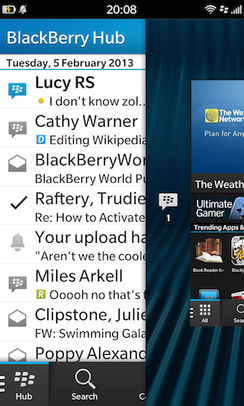
BlackBerry 10 (BB10) is a discontinued proprietary mobile operating system for the BlackBerry line of smartphones, both developed by BlackBerry Limited. Released in January 2013, BlackBerry 10 is a complete rework from the company's previous BlackBerry OS software.
A mobile application or app is a computer program or software application designed to run on a mobile device such as a phone, tablet, or watch. Mobile applications often stand in contrast to desktop applications which are designed to run on desktop computers, and web applications which run in mobile web browsers rather than directly on the mobile device.
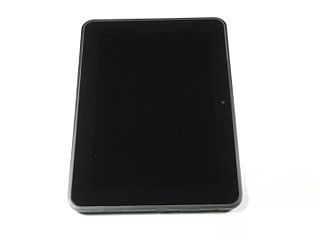
The Fire HD, also known as Kindle Fire HD in the generations prior to 2014, is a member of the Amazon Fire family of tablet computers. Fire HD refers to Amazon Fire family tablets with HD resolution. The many generations Fire HD subfamily includes: 7" and 8.9", 7", 6" and 7", 8" and 10.1", 8", 8" and 10.1", 8", 10.1", 8", 10.1", 8", and 11". These devices run the Fire OS operating system.
A mobile software content rating system is a rating system which is tailored to users of mobile software.

Resilio Sync by Resilio, Inc. is a proprietary peer-to-peer file synchronization tool available for Windows, Mac, Linux, Android, iOS, Windows Phone, Amazon Kindle Fire and BSD. It can sync files between devices on a local network, or between remote devices over the Internet via a modified version of the BitTorrent protocol.
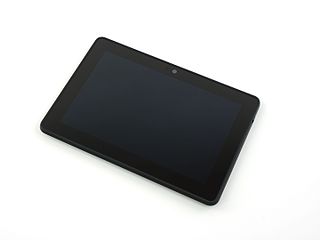
The Fire HDX, formerly named Kindle Fire HDX, was a high-end model in Amazon Fire line of tablet computers. It was announced on September 25, 2013, and was available in two models, 7 inch and 8.9 inch. The 7 inch WiFi model was released on October 18, 2013, and the 8.9 inch WiFi model was released on November 7, 2013, in the United States.
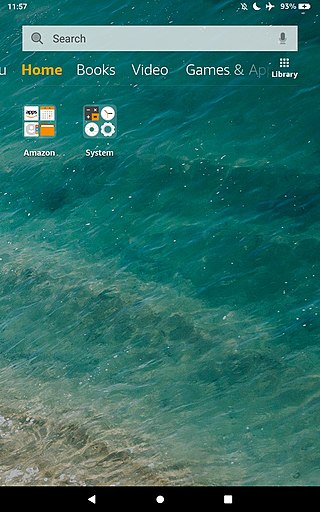
Fire OS is a mobile operating system based on the Android Open Source Project (AOSP). It is developed by Amazon for their devices. Fire OS includes proprietary software, a customized user interface primarily centered on content consumption, and heavy ties to content available from Amazon's storefronts and services.
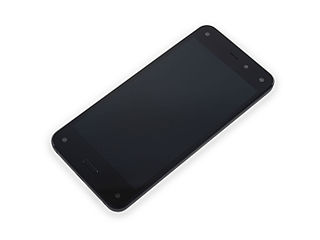
The Fire Phone is a discontinued 3D-enabled smartphone developed by Amazon and manufactured by Foxconn. It was announced on June 18, 2014, and marked Amazon's first foray into the smartphone market, following the success of the Kindle Fire. It was available for pre-order on the day it was announced. In the United States, it launched as an AT&T exclusive on July 25.
References
- ↑ Flood, Alison (2013-05-14). "Amazon launches Coins virtual currency". The Guardian. ISSN 0261-3077 . Retrieved 2019-05-26.
- ↑ "In-depth information about Amazon Coins". TechEngage. 2021-04-10. Retrieved 2021-04-10.
- ↑ Lance Whitney (February 19, 2014). "Amazon Coins branch out to all Android devices". CNet.
- ↑ "Appstore Developer Select". amazon.com. Amazon.com Inc. Archived from the original on 2014-07-05. Retrieved 20 June 2014.
- ↑ "Amazon Coins and Amazon Underground". mustips.com. MUS Tips. 2 August 2016. Retrieved 2 August 2016.
- ↑ "Introducing Amazon Coins: A New Virtual Currency for Kindle Fire". Amazon.com. February 4, 2013. Retrieved May 14, 2013.
- ↑ "What Are Amazon Coins?". CoinsFor.Sale. 10 December 2020. Retrieved 14 December 2020.
- ↑ "Amazon Coins Terms and Conditions". Amazon. Retrieved December 10, 2020.
- ↑ Metz, Rachel (February 5, 2013). "Could Amazon's Virtual Currency Buy You a Coffeemaker Someday? Paying for things in the Amazon Appstore may be just the first step for the online retailer's new virtual currency". MIT Technology Review. Retrieved September 29, 2015.